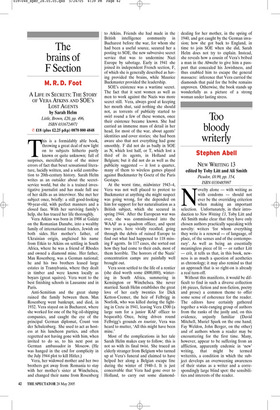The brains of F Section
M. R. D. Foot
A LIFE IN SECRETS: THE STORY OF VERA ATKINS AND SOE’S LOST AGENTS by Sarah Helm Little, Brown, £20, pp. 496, ISBN 0316724971 ✆ £18 (plus £2.25 p&p) 0870 800 4848 This is a formidably able book, throwing a great deal of new light on to subjects hitherto partly known or quite unknown; full of surprises, mercifully free of the minor errors of fact that beset sensational literature, lucidly written, and a solid contribution to 20th-century history. Sarah Helm writes as an outsider about the secretservice world, but she is a trained investigative journalist and has made full use of her skills as an interviwer. She met her subject once, briefly: a still good-looking 90-year-old, with perfect manners and a closed face. With her surviving family’s help, she has traced her life thoroughly.
Vera Atkins was born in 1908 at Galatz on the Romanian Danube, into a wealthy family of international traders, Jewish on both sides. Her mother’s father, of Ukrainian origin, anglicised his name from Etkin to Atkins on settling in South Africa, where he was a friend of Rhodes and owned a diamond mine. Her father, Max Rosenberg, was a German national; he and his two brothers leased large estates in Transylvania, where they dealt in timber and were known locally as boyars (great squires). Vera went to the best finishing schools in Lausanne and in Paris.
Anti-Semitism and the great slump ruined the family between them. Max Rosenberg went bankrupt, and died, in 1932. Vera stayed on in Bucharest, where she worked for one of the big oil-shipping companies, and caught the eye of the principal German diplomat, Count von der Schulenburg. She used to act as hostess at his luncheon parties, and often regretted not having gone with him, when invited to do so, to his next post as German ambassador in Moscow. (He was hanged in the end for complicity in the July 1944 plot to kill Hitler.) Vera, her widowed mother and her two brothers got away from Romania to stay with her mother’s sister at Winchelsea, and changed their name from Rosenberg to Atkins. Friends she had made in the British intelligence community in Bucharest before the war, for whom she had been a useful source, secured her a posting to SOE, the new subversive secret service that was to undermine Nazi Europe by sabotage. Early in 1941 she joined its independent French section, F, of which she is generally described as having provided the brains, while Maurice Buckmaster provided the leadership.
SOE’s existence was a wartime secret. The fact that it sent women as well as men to work against the Nazis was more secret still. Vera, always good at keeping her mouth shut, said nothing she should not, as torrents of publicity started to swirl round a few of these women, once their existence became known. She had carried an immense mass of detail in her head, for most of the war, about agents’ identities and cover stories; she had been aware also that not everything had gone smoothly. F did not do as badly in SOE as N, which lost half, or T, which lost a third of its agents, in Holland and Belgium; but it did not do as well as the publicity suggested — it lost a quarter, many of them to wireless games played against Buckmaster by Goetz of the Paris Gestapo.
At the worst time, midwinter 1943–4, Vera was not well placed to protest to Buckmaster at anything she might suspect was going wrong, for she depended on him for support for her naturalisation as a British subject, which she secured in spring 1944. After the European war was over, she was commissioned into the WAAF as a squadron officer, and spent two years, here vividly recalled, going through the debris of ruined Europe to find out what had happened to 118 missing F agents. In 117 cases, she sorted out how they had come to their ends, most of them horrible. The horrors of the Nazis’ concentration camps are painfully well brought out.
Vera soon settled to the life of a rentier (she died worth some £800,000), wintering in South Africa, summering in Kensington or Winchelsea. She never married. Sarah Helm establishes the great love of her early twenties for Dick Ketton-Cremer, the heir of Felbrigg in Norfolk, who was killed during the fighting in Crete in 1941, leaving Vera £500 (a large sum for a junior RAF officer to bequeath). Once, being driven round Felbrigg’s grounds en touriste, Vera was heard to mutter, ‘All this might have been mine.’ Most of the complications in her tale Sarah Helm makes easy to follow; this is not so with its final twist. She traced an elderly stranger from Belgium who turned up at Vera’s funeral and claimed to have helped her along a Belgian escape line during the winter of 1940–1. It is just conceivable that Vera had gone over to Holland, to carry out some diamond dealing for her mother, in the spring of 1940, and got caught by the German invasion; how she got back to England, in time to join SOE when she did, Sarah Helm does not try to explain. Instead, she reveals how a cousin of Vera’s bribed a man in the Abwehr to give him a passport that concealed his Jewishness, and thus enabled him to escape the general massacre: inference that Vera carried the diamonds that paid for the bribe remains unproven. Otherwise, the book stands up wonderfully as a picture of a strong woman under lasting stress.






















































 Previous page
Previous page